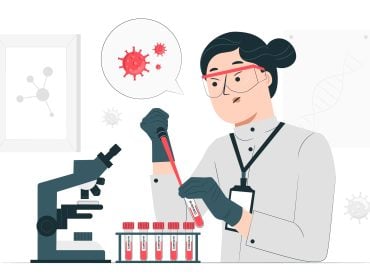STD Lab Testing Vs At Home Testing
When deciding between STD lab testing and at-home kits, accuracy remains a central concern. Lab tests conducted by professionals typically offer high reliability due to stringent quality controls. In contrast, the precision of home test kits can vary widely depending on manufacturer standards.
Although cost-effective and convenient, users must carefully consider if these savings align with their need for trustworthy results. Direct comparisons reveal that while at-home options seem to increase privacy and accessibility, laboratory STD Testing stands as the gold standard in diagnostic accuracy and medical privacy.
Assessing Accuracy: Lab Testing vs. Home Kits
In the realm of STD screening, lab tests and home kits have their distinct paths. Lab assessments boast professional oversight, yielding results many trust with labs that abide by HIPPA standards. Yet home kits offer a unique edge: they’re embraced for ease and privacy by users who might want to dodge clinic or lab visits altogether.
Research underscores how most folks find DIY urine or vaginal swabs straightforward to carry out in comfort’s sphere. Important too is this: while accuracy between both methods can be similar, it hinges on proper self-collection techniques with at-home options—missteps here may skew outcomes. Studies suggest these mail-in tests could enhance STI detection rates among youth less likely to seek clinical care due to limited access or other barriers.
Self-testing proves its worth as an empowering tool; it nudges individuals toward proactive health management that otherwise might be sidestepped. Noteworthy are findings from Sweden to the UK indicating broad implementation success of such screens that are sent in the mail.
Cost Comparison of STD Test Methods
When weighing STD test options, lab tests outperform at home kits and accuracy and federal approvals. STDCheck.com offers the only FDA approved HIV RNA early detection tests and only uses CLIA Certified labs for testing offering privacy and peace of mind about your medical information. We offer reliable and fast testing at prices lower then most at home test kits.
Tests typically need urine, blood or a swab from various body parts. Clinics have done such testing for ages; the struggle is ensuring at-home kit accuracy. Home versions require sending samples to labs – not giving instant results like COVID rapid tests do.
Due to pandemic restrictions limiting clinic visits recently public health departments had to adapt by mailing free test kits. Sales of Everly Health’s online STD kits shot up 120% early this year versus last year’s start half-year stats; they’re meeting unmet demands along with other companies rushing into direct consumer sales including CVS store-based test availability.
STDCheck.com offers a 10 panel STD test for $139. None of our competitors can offer an at-home test kit that tests for the 10 most common STDs at that kind of price with a guaranteed 99% accuracy rating and a private doctors consultation follow up. Even a free test at a local clinic does not offer the value of an STD test from STDCheck.com
Confidentiality Concerns with At-Home Tests
When you test at home, who sees your results? This worry hits hard. Kits come to your door; simple, right?
The path from box to lab could leak personal facts if not tight and secure – a risk worse for those in small places where talk spreads fast. Labs have rules that guard what they know about you. They lock down info by law—big walls around your secrets there.
At home tests bypass some of these safe steps. So, ask yourself: Are the people handling my data keeping it hush as needed? Your peace of mind counts too—a stress many don’t think on until after the click or swipe ordering that kit online.
Understanding the Reliability of Laboratory Results
Direct-to-consumer (DTC) STI tests offer privacy and ease, key for teens and young adults who avoid clinics out of embarrassment or fear of stigma. These online services simplify obtaining test kits from vendors with most online vendors requiring purchasers to be at least 18 years old; one collects their own sample to mail to a lab. This way is seen as less daunting than discussing sexual history during in-person visits often avoided due to discomfort or limited clinic access.
Clinicians also benefit when overwhelmed with patient loads because DTC can aid routine screenings recommended by the CDC, especially amid pandemic restrictions that have pushed many towards remote testing options.
The Convenience Factor: Home versus Lab
Choosing where to get tested for STDs can be tough. Home kits offer privacy and ease as long as you are not trying to hide your test from others in your home.
Most people initially thing at home tests are private and affordable at first but in truth that is not the case. Mistakes in self-collecting samples can cause incorrect results with home kits. Without expert help, you risk overlooking other health issues that need treatment, such as gynecologic infections that mimic STD symptoms.
Lab screenings provide professional support throughout the testing process plus crucial aftercare advice – they suggest when you should test again, handle unusual cells findings from Pap smears through colposcopy examination and treat non-STD-related conditions as well.
Professional Oversight in Standard STD Testing
Professional oversight in standard STD testing ensures that each person gets correct results. Experts say this is key to stop the spread of these illnesses. They often show no signs, so people may pass them on without knowing it, risking health problems like heart damage or infertility if not caught early with tests.
Labs follow strict rules and have trained staff who make sure every step from sample collection to result delivery goes right. But internet-based tests are different; they’re new and growing fast because they’re easy for users. Studies show many prefer web tests due to their privacy and ease compared to clinic visits.
Yet worries linger about how well home samples work compared with those done by a doctor’s hand—these fears must be calmed down for more folks to use online services willingly. In places like England, certain infections have seen shocking rises. Syphilis cases jumped 126% over five years, showing the need for strong systems that combine professional lab checks with convenient online options without compromising quality.
Navigating Insurance Coverage for STD Screenings
Many worry about the cost of STD tests. Good news: under the ACA, if one shows no symptoms but might be at risk, their STD screening is often free or cheaper with health insurance. However, this doesn’t cover all cases and ages.
For example, HIV screenings are insured for most between 15 to 65 years old; others at high risk also get coverage. Women up to age 24 who are sexually active can get chlamydia and gonorrhea checks paid for too. For those showing signs of an STD—this turns into a diagnostic test—not always covered by the ACA plans across insurers.
Costs vary widely from $25 upwards in clinics but there may be low-cost alternatives available locally.
STD lab testing, offered by services like STDCheck, provides professional analysis and reliable results. This method ensures accuracy through stringent laboratory procedures. On the other hand, at-home testing kits offer convenience and privacy but may lack in precision compared to lab tests due to potential user error during sample collection.
Individuals must weigh their need for confidentiality against the necessity for dependable outcomes when choosing between these two options for sexually transmitted disease screening.
Secure and Confidential
STD testing services
The fastest results possbile - available in 1 to 2 days





